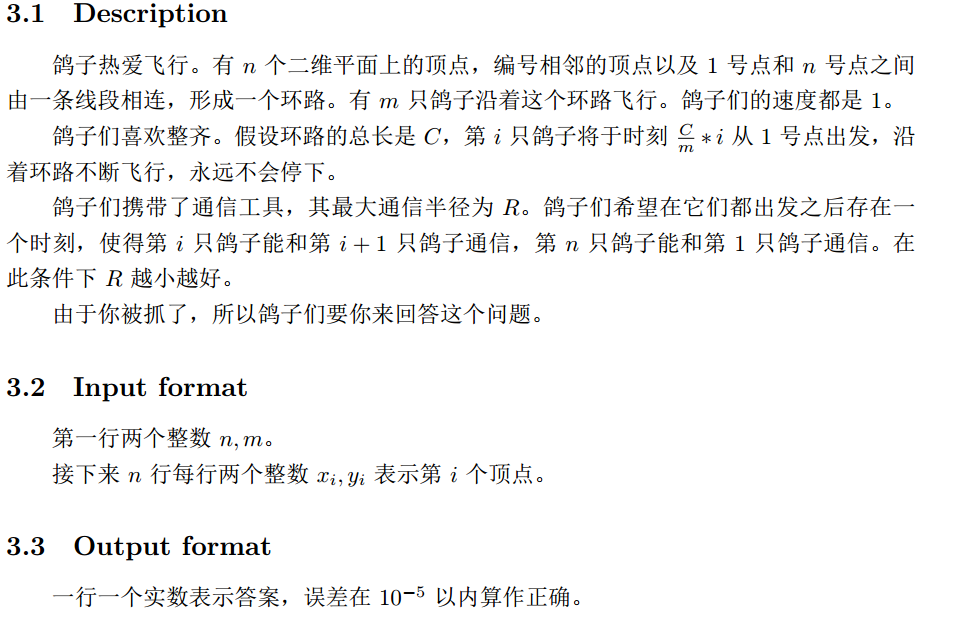题目描述:

样例:
input:
4 2
0 0
0 1
1 1
1 0
output:
1.0000000000数据范围与约定:

标签:计算几何(吧,不是很懂)
题解:

全场唯一AC代码:
#include <bits/stdc++.h>
using std::pair;
using std::vector;
using std::string;
typedef long long ll;
typedef pair<int, int> pii;
#define fst first
#define snd second
#define pb(a) push_back(a)
#define mp(a, b) std::make_pair(a, b)
#define debug(...) fprintf(stderr, __VA_ARGS__)
template <typename T> bool chkmax(T& a, T b) { return a < b ? a = b, 1 : 0; }
template <typename T> bool chkmin(T& a, T b) { return a > b ? a = b, 1 : 0; }
const int N = 100000;
const int oo = 0x3f3f3f3f;
template<typename T> T read(T& x) {
int f = 1; x = 0;
char ch = getchar();
for(;!isdigit(ch); ch = getchar()) if(ch == '-') f = -1;
for(; isdigit(ch); ch = getchar()) x = x * 10 + ch - 48;
return x *= f;
}
const double eps = 1e-9;
typedef struct Point {
double x, y;
Point() { }
Point(double x_, double y_): x(x_), y(y_) { }
} Vector;
Point operator - (const Point& a, const Point& b) { return Point(a.x - b.x, a.y - b.y); }
Point operator + (const Point& a, const Point& b) { return Point(a.x + b.x, a.y + b.y); }
Point operator * (const Point& a, const double&b) { return Point(a.x * b, a.y * b); }
Point operator / (const Point& a, const double&b) { return Point(a.x / b, a.y / b); }
double dot(const Point& a, const Point& b) { return a.x * b.x + a.y * b.y; }
double len(const Point& a) { return sqrt(dot(a, a)); }
Point unit(const Point& a) { return a / len(a); }
double T;
int n, m;
Point p[N + 5];
typedef pair<int, double> pid;
typedef pair<double, double> pdd;
int dcmp(double x) {
return (x > -eps) - (x < eps);
}
vector<pdd> solve(double a, double b, double c) {
static vector<pdd> res;
res.clear();
if(dcmp(a) == 0) {
if(dcmp(b) == 0) {
if(dcmp(c) <= 0) {
res.pb(mp(-1e9, 1e9));
}
return res;
}
if(dcmp(b) > 0) {
res.pb(mp(-1e9, -c / b));
} else {
res.pb(mp(-c / b, 1e9));
}
return res;
}
double delta = b * b - 4 * a * c;
if(dcmp(delta) < 0) {
if(dcmp(a) < 0) {
res.pb(mp(-1e9, 1e9));
}
return res;
}
double x0 = (- b - sqrt(delta)) / (2*a), x1 = (- b + sqrt(delta)) / (2*a);
if(x0 > x1) std::swap(x0, x1);
if(dcmp(a) > 0) {
res.pb(mp(x0, x1));
} else {
res.pb(mp(-1e9, x0));
res.pb(mp(x1, 1e9));
}
return res;
}
#define nxt(x) ((x + 1) % n)
vector<pdd> range;
void get_range(double l) {
range.clear();
double t = T / m;
pid a = mp(0, len(p[1]-p[0])), b;
for(int i = 0; i < n; ++i) {
double l_ = len(p[nxt(i)] - p[i]);
if(l_ < t) t -= l_; else { b = mp(i, l_ - t); break; }
}
t = 0;
while(a.fst < n) {
Point va = unit(p[nxt(a.fst)] - p[a.fst]);
Point vb = unit(p[nxt(b.fst)] - p[b.fst]);
Point pa = p[nxt(a.fst)] + unit(p[a.fst] - p[nxt(a.fst)]) * a.snd;
Point pb = p[nxt(b.fst)] + unit(p[b.fst] - p[nxt(b.fst)]) * b.snd;
double d = std::min(a.snd, b.snd); a.snd -= d, b.snd -= d;
if(!dcmp(a.snd)) a.fst = a.fst + 1 , a.snd = len(p[nxt(a.fst)] - p[a.fst]);
if(!dcmp(b.snd)) b.fst = nxt(b.fst), b.snd = len(p[nxt(b.fst)] - p[b.fst]);
static vector<pdd> sol;
sol = solve(dot(va-vb, va-vb), 2.*dot(pa-pb, va-vb), dot(pa-pb, pa-pb) - l*l);
for(int i = 0; i < int(sol.size()); ++i) {
pdd tmp = sol[i];
chkmax(tmp.fst, 0.); chkmin(tmp.snd, d);
if(tmp.fst <= tmp.snd) {
range.pb(mp(tmp.fst + t, tmp.snd + t));
}
}
t += d;
}
//for(auto x : range) { printf("%lf %lf\n", x.fst, x.snd); }
}
bool chk(double l) {
get_range(l);
static vector<pdd> can;
static vector<double> pos;
for(int i = 1; i < int(range.size()); ++i) {
if(range[i].fst < range[i-1].snd + 1e-6) range[i].fst += 1e-6;
}
vector<pdd>::iterator it = range.begin();
can.clear();
pos.clear();
for(int i = 1; i <= m; ++i) {
double L = (i-1)*T / m, R = i*T / m;
for(; it != range.end() && (*it).fst <= i*T / m; ) {
double x = std::max((*it).fst, L);
double y = std::min((*it).snd, R);
can.pb(mp(x-L, y-L));
pos.pb(x-L), pos.pb(y-L);
if((*it).snd <= i*T / m + eps) ++ it; else break;
}
}
static int cnt; cnt = 0;
static double q[N*4 + 5];
std::sort(pos.begin(), pos.end());
std::sort(can.begin(), can.end());
it = can.begin();
for(int i = 0; i < int(pos.size()); ++i) {
while(it != can.end() && (*it).fst <= pos[i]) {
q[cnt ++] = (*it).snd; ++ it;
std::push_heap(q, q + cnt, std::greater<double>());
}
while(cnt && q[0] < pos[i]) {
std::pop_heap(q, q + (cnt--), std::greater<double>());
}
if(cnt >= m) return true;
}
return false;
}
int main() {
freopen("n.in", "r", stdin);
freopen("n.out", "w", stdout);
read(n), read(m);
for(int i = 0; i < n; ++i) {
static int x, y;
read(x), read(y);
p[i] = Point(x, y);
}
for(int i = 0; i < n; ++i) T += len(p[nxt(i)] - p[i]);
int TIMES = 50;
double l = 0, r = 4000;
for(; TIMES--; ) {
double mid = (l + r) / 2.0;
if(chk(mid)) r = mid; else l = mid;
}
printf("%.10lf\n", r);
return 0;
}